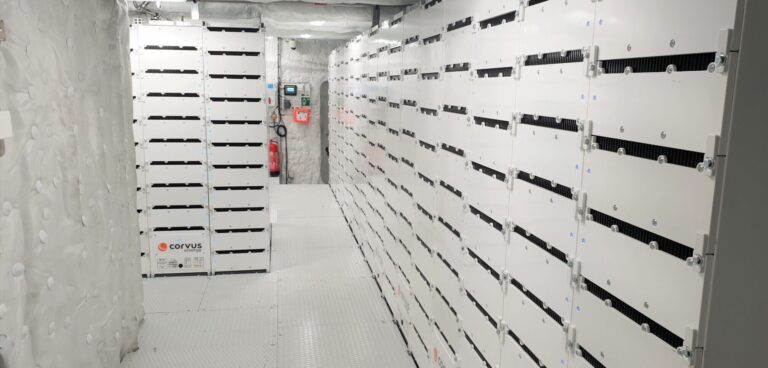A three-year memorandum of understanding (MoU) has been agreed between maritime energy storage system (ESS) manufacturer Corvus Energy and Yaskawa Environmental Energy/The Switch.
The MoU will see the continuing development of Yaskawa Environmental Energy/The Switch’s Battery Short-Circuit Limiter (BSCL) protection device for large-scale battery solutions and advanced DC power distribution. The agreement also includes the joint promotion of each partner’s products.
When connecting high-energy-content batteries to one electrical system, there is a high risk of releasing a large amount of short-term current that can result in system damage. Due to this, battery packs have to be split between several DC hubs to handle the amount of energy. As more batteries are added, more DC hubs are required – up to eight for a 20MWh ESS.
The BSCL limits short-term current from each set of batteries and blocks the short-circuit system immediately. This enables more batteries to be connected to the system and fewer DC hubs are required. This results in a system which is compact in nature and delivers financial savings for users in addition to safety, efficiency and reliability.
“The BSCL is essentially an ultra-fast, semi-conductor-based protection device that operates based on actual system measurements with microsecond response,” said Teemu Heikkilä, head of product line, converters, Yaskawa Environmental Energy/The Switch. “It opens the DC electrical circuit by disconnecting a battery set in the event of a fault anywhere in the system, preventing the battery set from discharging itself. Such a sudden release of energy could result in major damage and, in the worst case, an electrical fire. BSCL minimizes the risk by stopping the energy loss in microseconds.”
Heikkilä continued, “From a technical perspective, the market hasn’t yet come to grips with this connectivity challenge. Class rules, which were primarily designed for AC/DC systems, are lagging behind the rapid pace of technology in DC power distribution. The BSCL is the first product fit for purpose with battery systems that are getting bigger almost by the day.
“Its key benefit, mirroring the electrification trend where the larger the ESS the better, is that you can increase the energy content of the ESS while minimizing the number of parallel systems required. In principle, implementing BSCL means you still only need two DC hubs for an ESS up to 40MWh, so the savings grow in tandem with the size of the battery package.”
The latest device is compatible with Corvus’s ESS portfolio which includes the Corvus Orca. The solution, however, is particularly suited to the Blue Whale ESS, a system which was developed to meet large operational energy demands at a cost-effective kWh price.
The Blue Whale system was designed specifically for large battery installations which are bigger than 10MWh, such as those on cruise ships or merchant vessels. The BSCL is a standalone device developed for installation near to batteries and between drives. Furthermore, the BSCL can be retrofitted to existing systems for added security.
“We are very happy to be working with Corvus Energy as a world leader in marine ESS and look forward to constructive collaboration and teamwork,” commented Miika Reinikka, division president, Yaskawa Environmental Energy/The Switch.
“We are pleased to join forces with Yaskawa Environmental Energy/The Switch,” said Geir Bjørkeli, CEO, Corvus Energy. “Their unique skill in thinking outside the box to solve complex challenges makes them a valuable partner on our journey to decarbonize shipping. Their innovative technology makes a big difference for the utilization, scalability and safety of marine battery systems.”



